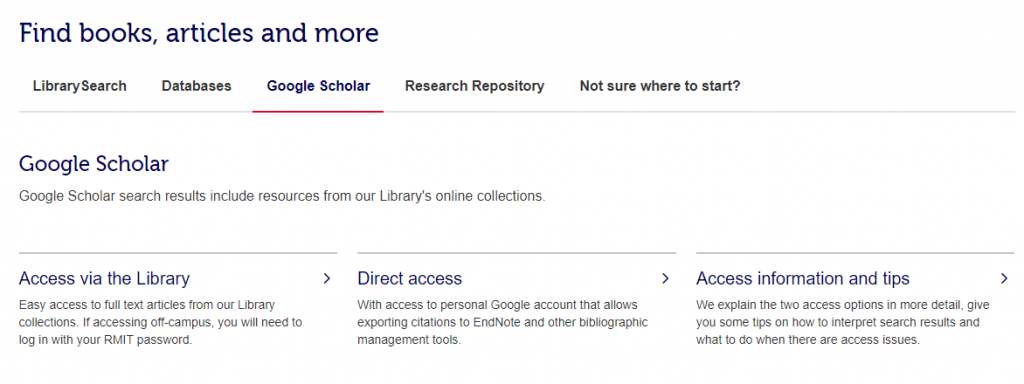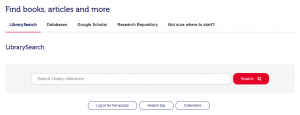Using search engines
Google and Google Scholar

Many people begin their research with Google, and sometimes Google Scholar. Google can be useful to get an overview, background information, or to define terms. We all Google – but are you doing it effectively?
Using Advanced Google or Google Scholar improves your chance of obtaining relevant information. Researchers are expected to use scholarly information and Google alone is insufficient.
Google Advanced lets you choose combinations of words – e.g. all these words, exact phrase or word etc., and narrow results by language, region, last update, site or domain, file type, etc.
The following table provides a comparison of the difference in features between Google and Google Scholar.
Google vs. Google Scholar
| Features | Google Scholar | |
|---|---|---|
| Easy to search interface | Yes | Yes |
| Coverage | Many sources, good definitions, background information, government/company reports, but uncontrolled content. | Indexes scholarly sources, but with uneven discipline content. |
| Format | Varied, news, company reports, trade and government publications, grey literature. | Scholarly material, articles, conference papers, book chapters, patents. |
| Search results with basic filtering | Yes, with Advanced Google. | Limited |
| Search alerts | No | Yes |
| Search metrics | No | Yes |
| Author profiles | No | Yes |
| Full-text access | Yes, depending on sources. | Yes, but payment may be required. |
| Export citations to reference managers | No | Yes |
Best Practice Tip
Sign in to Google Scholar via the Library webpage to access full text that RMIT holds in linked databases.
See the image below for where to find Google Scholar on the RMIT Library homepage.

(Copyright © 2022 RMIT University)
Activity
Search Google Scholar using some of your search query keywords.
As you search make note of the following:
- The different types of resources in your results list
- Can you follow a link to the full text of the article or resource?
- Look for where to refine your search by date or relevance, and also where you can include (or exclude) patents and citations
There are also further tools in Google Scholar to find related material. These are located under each of the titles listed in your search results.
Can you find the Cite, Cited by, Related articles, and Save links?
See if you can also find where to save an alert for your search. Saving an alert will provide an email feed for any new papers on your topic, as they are added to Google Scholar.
Test your knowledge
LibrarySearch
LibrarySearch is RMIT University Library’s search engine and an important place to continue your literature search.
You can use LibrarySearch to retrieve a wide variety of materials:
- Books and E-books
- Journal and newspaper articles
- DVDs and streaming video
- Theses and more
Make sure to log in to LibrarySearch as some resources are only available when you log in. Look for the ‘Log in for full access’ button on the Library’s homepage

(Copyright © 2022 RMIT University)
Watch this video for a brief introduction to LibrarySearch
What is LibrarySearch? (1:07 mins)
What is LibrarySearch? (1:07 mins) by RMIT University (YouTube)
LibrarySearch is particularly good for:
- Getting an overview of the Library’s physical and online collections
- Finding “something” on a topic
- The refine features to narrow your search results
There are refine options in the menu on the left, including:
- Peer-reviewed articles, full text online
- Resource type – articles, books, etc.
- Subject
- Date range
To access full text for online material e.g. e-books or journal articles, you click on the ‘View Online’ link at the item record.
LibrarySearch does not provide even coverage of the subject area. Specialised subject databases in business, architecture, psychology, legal, and fashion are not covered by LibrarySearch.
As a researcher, you will also need to search specialist library databases. We will be looking at these databases later in this module.
Activity
Go to LibrarySearch on the Library homepage and search using keywords for your own research topic.
Locate a peer-reviewed article on your topic and access the full text.
Research Repository / Theses
The RMIT Research Repository is an open-access institutional repository providing free, searchable access to research publications authored by RMIT University staff and students.
Most theses submitted at RMIT University can be found in the RMIT Research Repository.
Theses can be invaluable sources for in-depth and significant research related to your field of study. The RMIT Finding and obtaining theses research guide is a great starting point for resources that will allow you to access Australian and international theses.
Activity
- Search the RMIT Research Repository
- Enter your search term, for example, climate change
- Limit your search results to ‘Dissertations & Theses’
- The ‘Refine your results’ enables further selection of:
- Resource type
- Research unit
- Author
- Identify a relevant thesis to your topic

